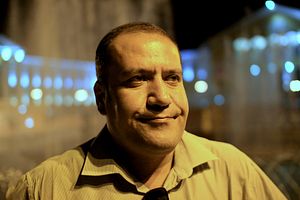On July 11, Tajik journalist and comedian Khayrullo Mirsaidov was sentenced to 12 years in prison after a court in Khujand convicted him of embezzlement, forging documents, and providing false testimony.
Just another win in Dushanbe’s fight against corruption, right?
Far from it.
Mirsaidov’s troubles began last November 2017 when he penned an open letter addressed to Tajik President Emomali Rahmon, Prosecutor General Yusuf Rahmon, and then-Governor of Sughd region Abdurahmon Kodiri (whose grandson married President Rahmon’s granddaughter that same month) accusing Sughd regional officials of corruption. Mirsaidov alleged that the head of the region’s youth and sports affairs directorate, Olim Zohidzoda, demanded a $1,000 bribe and pushed Mirsaidov to misuse public funds allocated for the Khujand-based competitive comedy troupe KVN Mirsaidov led. Zohidzoda, in turn, accused Mirsaidov of slander.
On December 5, Mirsaidov was arrested and charged with embezzlement, forging documents, providing false testimony, and incitement. The incitement charge was later dropped.
As Eurasianet noted at the time of his arrest, Mirsaidov’s public profile stemmed from his involvement with the KVN comedy troupe, “a much-loved post-Soviet cultural institution” featuring teams battling it out with tests of wit and improvisational skills. The team had earlier complained of lack of support from the Tajik government and business community.
Mirsaidov also worked, until 2014, as a regional correspondent for Asia-Plus and for Germany’s Deutsche Welle. He has also been involved over the years in various development projects funded by the Organization for Security and Cooperation in Europe (OSCE), the United Nations Development Program (UNDP), and the UK’s Department for International Development (DFID).
Mirsaidov’s trial began on June 8.
The case has drawn attention from the usual suspects in the human rights and media freedom advocacy communities and the typical measured expressions of concerns from the diplomatic community.
In December, when Mirsaidov was arrested, the Committee to Protect Journalists (CPJ), Human Rights Watch (HRW), and others raised concerns about the charges against Mirsaidov. CPJ Deputy Executive Director Robert Mahoney, in an alert issued by the organization, called on the Tajik authorities to release Mirsaidov. “In a place where free media and critical voices are nearly non-existent, journalists like Mirsaidov should be recognized for the important work they do, not locked up on bogus charges,” Mahoney wrote.
Human Rights Watch’s Central Asia researcher, Steve Swerdlow, commented at the time that Mirsaidov “appears to be the latest victim of the Tajik government’s crackdown on critical voices.”
Calls from human rights and media freedom organizations for Mirsaidov’s relsease went unheeded, unsurprisingly, by the Tajik government. Diplomatic efforts also yielded little apparent impact on the trial’s outcome, with Mirsaidov’s supporters — pointing to his history of work with Western organizations — expressing dismay at what they perceived as a lackluster outcry in response to his imprisonment.
In April, the U.S. Mission to the OSCE issued a statement of concern about Mirsaidov’s detention. “The severe nature of the charges, and their timing, create concern that authorities are retaliating against Mr. Mirsaidov for his whistleblower activities,” the statement read. It went on to note that the arrest “reflects a pattern of increasing pressure on media freedom in Tajikistan.” The European Union echoed the sentiment in its own statement.
Following Mirsaidov’s conviction and sentencing on July 11, the Embassies of the United Kingdom, Germany, France, the United States, and the EU Delegation in the Republic of Tajikistan issued a joint statement expressing their “common grave concern” about Mirsaidov’s trial. The statement called the the 12-year prison sentence “extremely harsh, [and] incomparable with the crime he was accused of,” and commented that the sentence “will have a negative impact on the freedom of media and expression in Tajikistan…” The embassies urged Tajikistan to reconsider, noting their concern “that this sentence will compromise our joint struggle for good governance and thus cast a shadow on our cooperation.”
But how much of a shadow will Mirsaidov’s case truly cast on relationships that have weathered a steady stream of kangaroo court trials and harsh sentences? Since 2015, Tajikistan has taken a serious turn, eliminating political opposition and engendering a public atmosphere incompatible with a free press.
Asia-Plus gathered reactions to Mirsaidov’s conviction and sentencing from Tajik experts and journalists. Abdumalik Kodirov called it a disaster, calling attention to the dissonance between what the Tajik state asks its citizens to do (report corruption) and what the state does in response (arrest the person who reported the corruption for a false accusation). “Tell me, please, how many people will there be, after that, who will report the fact of corruption?”
Others pointed to the 12-year sentence as evidence that the trial was political in nature, rather than about an economic crime, and expressed concerns about the impact the case will have on Tajikistan’s international image.
On Twitter, Swerdlow of Human Rights Watch said, “Today’s draconian, unjust 12 yr-prison sentence of a journalist in #Tajikistan is rude awakening to all of #Tajikistan‘s international partners about depths to which its abysmal #humanrights record has sunk. This isn’t just a mortal blow to journalism, but to every Tajik citizen.”
































